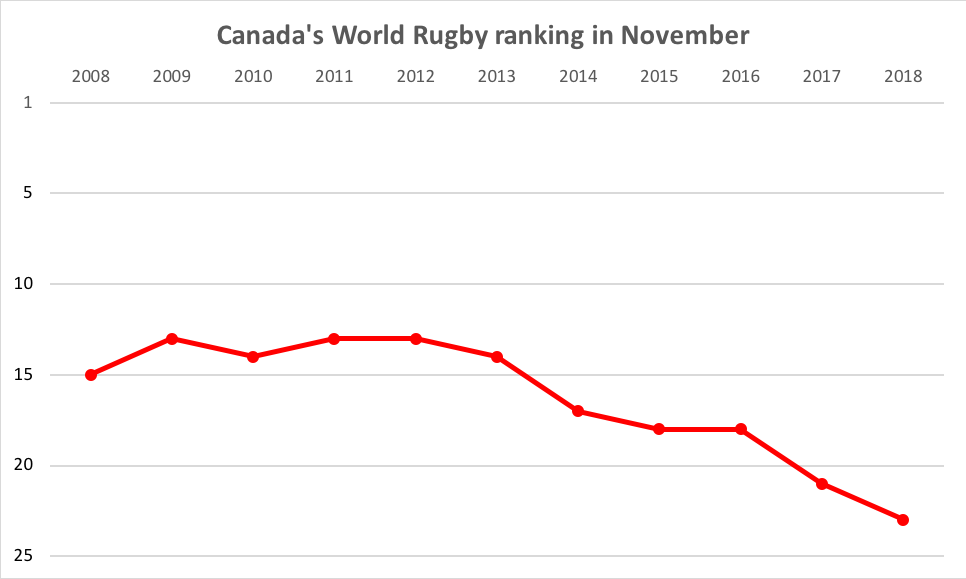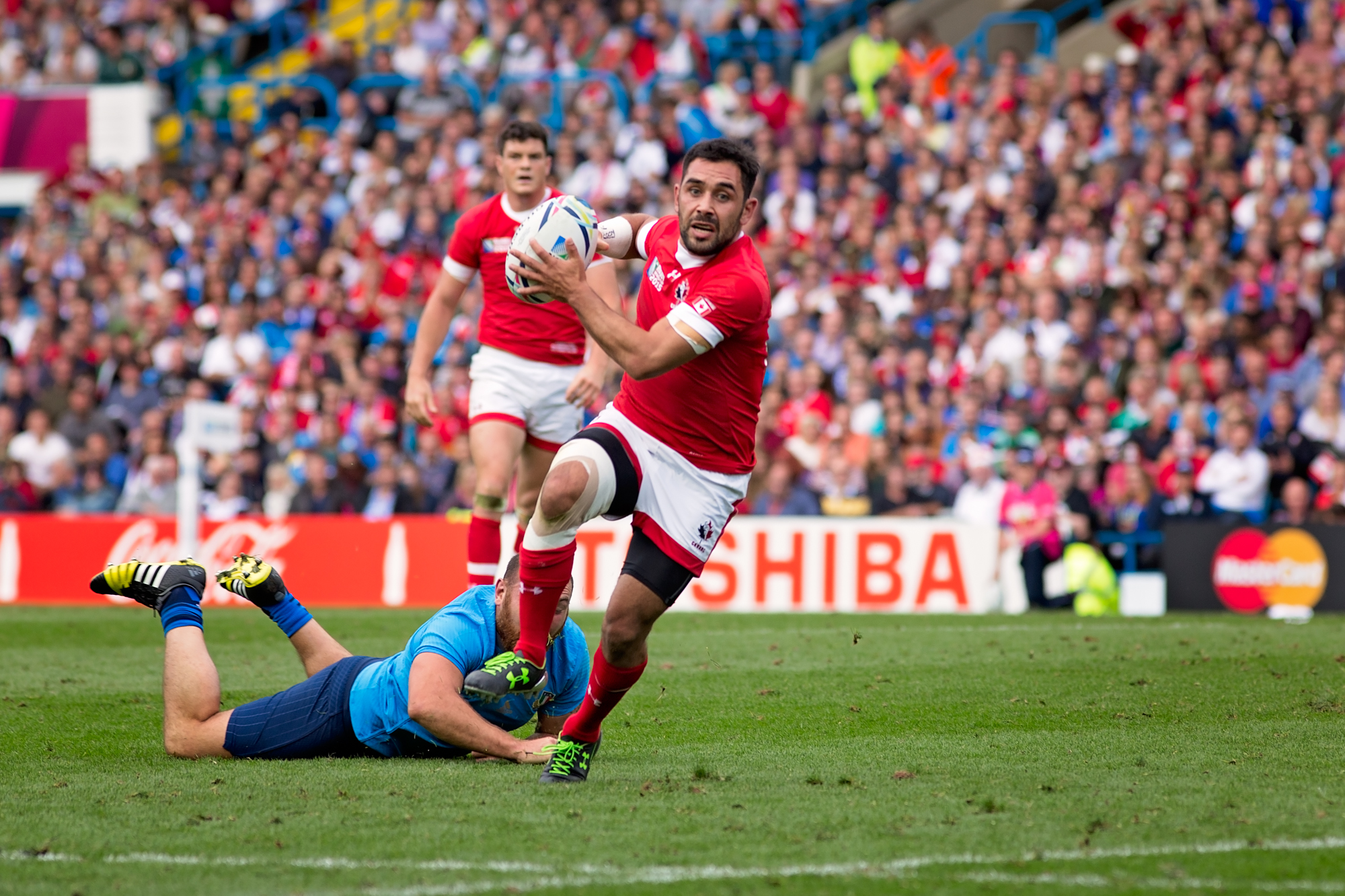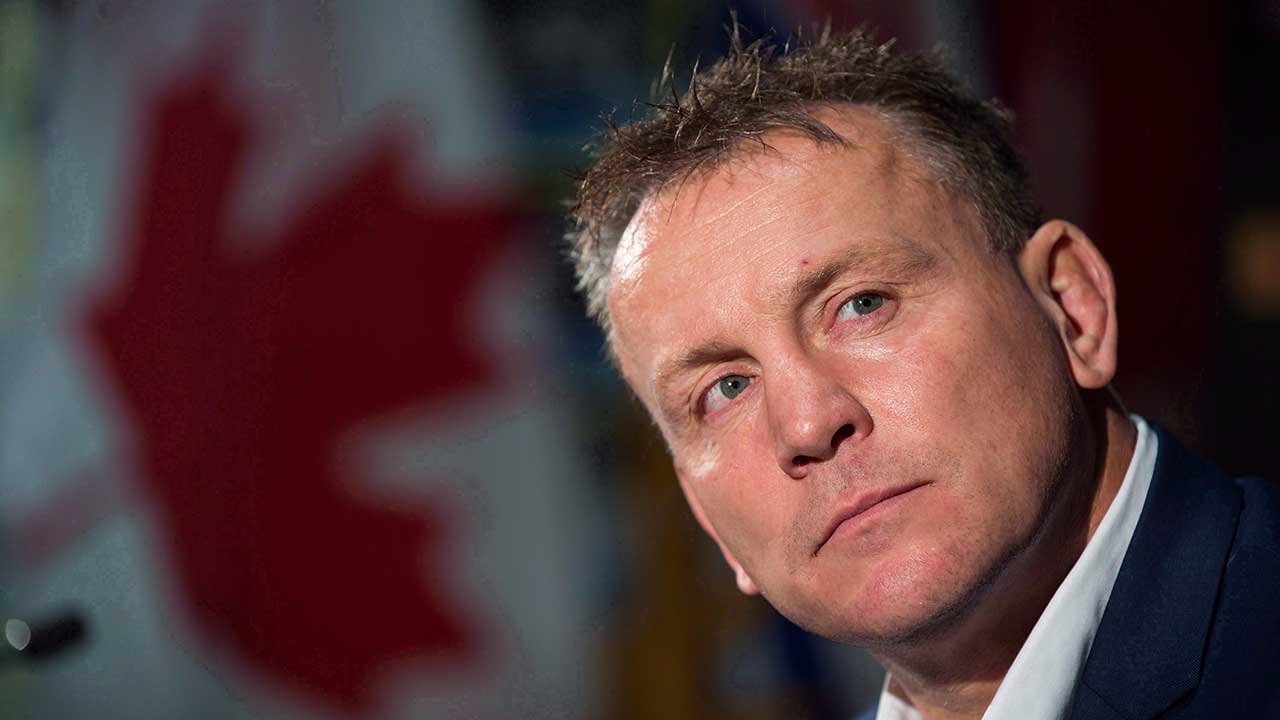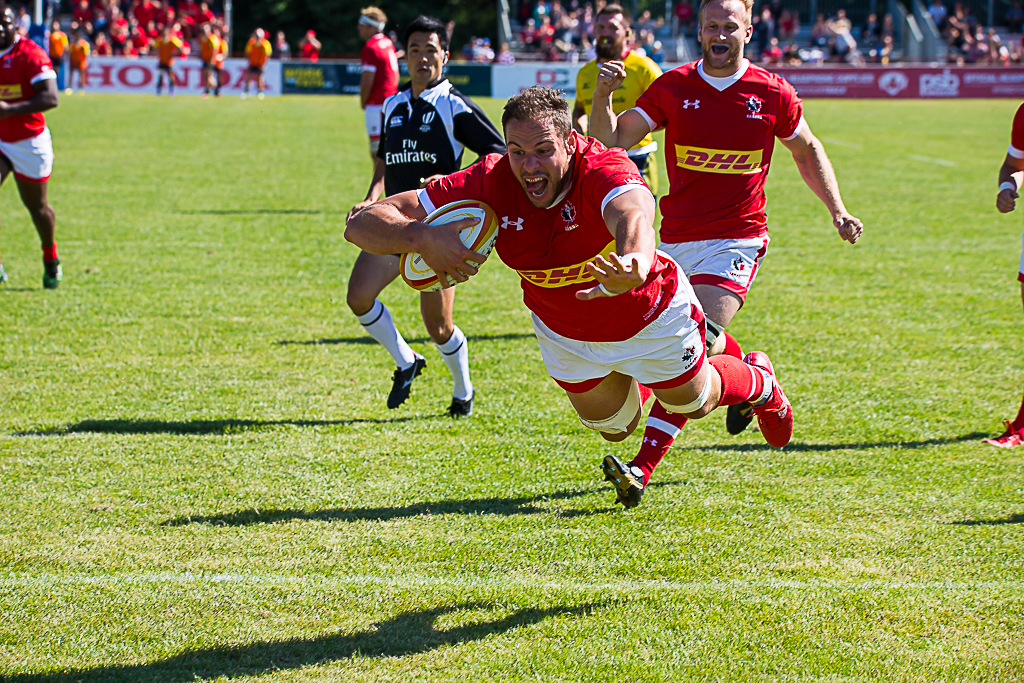Over the next three weekends, at a 5,000-seat facility in the south of France, the future of Canadian rugby will be sent in one of two very different directions. Three games, three unfamiliar opponents, one final berth in the 2019 Rugby World Cup on the line.
“This is,” says Canada’s head coach, Kingsley Jones, “a critical period.”
The Stakes
Here’s the deal. Canada’s national men’s team has thus far failed twice to qualify for next year’s World Cup in Japan, and now must win a last-chance repechage tournament in Marseille, France in order to claim the 20th and final spot in World Rugby’s ultimate competition. Hong Kong, Kenya, and Germany will compete with Canada in the tournament, with each team playing each other once. Whichever team finishes the round-robin in first place earns the World Cup berth.
There’s no underselling how important this tournament is for Canada, which has never missed a World Cup and never had much trouble qualifying. Only five years ago, Canada was consistently a top-15 team in World Rugby’s global rankings. But they have struggled mightily since the last World Cup in 2015, and now sit No. 23, trailing much smaller nations with far less historical success in the sport, such as Uruguay, Hong Kong, and Namibia.

But missing out on the tournament wouldn’t only be a further hit to the national program’s prestige — it would be extremely detrimental to its pocketbooks as well. In 2015, World Rugby contributed $3.7 million to Rugby Canada’s operations as it prepared for the World Cup. The following year, that number dropped to $2.1 million.
Rugby Canada estimates another $1 million — at least — will be lost if Canada loses the repechage tournament and fails to qualify.
The loss of funding could have a cascading effect on Rugby Canada’s other operations, including age-grade sides, the men’s and women’s 7s teams, and the women’s 15s program, which currently sits No. 4 in World Rugby’s rankings.
Unusual financial measures have already been taken. Earlier this year, Rugby Canada upped registration fees for club players across the country by $20, citing the need to raise $450,000 to aid in the efforts to qualify for the World Cup. That followed “extensive budget reductions,” which Rugby Canada estimated to have reduced costs “in every program and activity to the tune of more than $1.5 million,” including “over $400,000 in salary savings.”
Then, in August, Rugby Canada reorganized its men’s playing pool, combining the 15s and 7s teams — which had been training separately — under one umbrella, shedding staff and reducing compensation for 7s players in the process.
The 7s athletes were incensed and boycotted training sessions while threatening to unionize. They’ve only recently reached an agreement with Rugby Canada to resume training, but that’s believed to have been done through gritted teeth, with the first tournament of this year’s 7s Series looming at the end of the month.
That’s why these three repechage games are so important. The impact of success or failure at this tournament extends well beyond merely qualifying for the World Cup.
“Indeed it does,” says Rugby Canada CEO Allen Vansen. “As we’ve said time and time again, it’s a critical part of Rugby Canada’s future. And, obviously, a huge part of our history. We’ve been at every single World Cup to date. I know Kingsley and every one of the men that he’s got on his [roster] don’t want to be the team that doesn’t get there.”

The Team
The good news is Canada will be close to full strength for these games, calling on its stable of overseas professionals to bolster a core group of domestic-based players. Scrum half Andrew Ferguson recently tore a biceps and is unavailable, as are all of the 7s athletes, who were still holding out over their contract dispute when Canada departed for the tournament. Otherwise, it’s all hands on deck.
Veteran scrum half Phil Mack will captain the team. He starred on the 7s circuit for years, but is dedicated solely to the 15s game today. An elusive ball-carrier and instinctual field general, Mack brings plenty of experience, mettle, and creativity to the role.
Loose forward Tyler Ardron and winger DTH van der Merwe will be counted on to play significant in-game leadership roles as well. Ardron is one of Canada’s most accomplished professionals, making eight appearances this season for the Chiefs in Super Rugby, the Southern Hemisphere’s top competition. And van der Merwe has been a pillar of Canadian rugby for more than a decade, representing his country at three World Cups and holding the Canadian record for international tries scored with 32.
Overseas professionals Brett Beukeboom, Jake Ilnicki, Josh Larsen, and Evan Olmstead will help anchor the forward pack, while Matt Evans, Ciaran Hearn, Shane O’Leary, Taylor Paris, and Conor Trainor will bring high-level experience in the backs.

The Coach
Tasked with preparing Canada for this tournament is Jones, a 49-year-old Welshman who’s led the Canadian men for only a year.
Jones made 10 back-row appearances for Wales in the late ’90s, before turning his attention to a coaching career that has taken him to England, South Africa, and even Russia, where he helmed the national program for four years. Last September, he took over the Canadian side after his predecessor, New Zealander Mark Anscombe, was fired following a string of poor results that culminated in Canada failing to qualify for the World Cup in a home-and-home series with the United States.
Jones arrived in Canada in October and had only a few months to prepare a team to play another home-and-home World Cup qualifier, this time with Uruguay. Canada dropped that one, too, a dispiriting result that cost the program nearly a half-million dollars in World Rugby funding. Now, a year later, Jones gets a second chance.
“It’s been a whirlwind 12 months,” Jones says. “I’ve learned a lot. Learned a lot of the players. I think we’re heading in the right direction.”
[pullquote]“This competition is about experience — it’s cup rugby. We need to be able to stand up under pressure. Because there will be pressure.”[/pullquote]
The Opposition
Canada will open the tournament against No. 28-ranked Kenya, before taking on No. 29 Germany in the second leg. Canada has never played a test match against either country due to geography and generally being a much higher-ranked side. But both teams will present challenges.
Kenya will bring plenty of pace and elusiveness, featuring several members of its national 7s team, including Collins Injera, who sits second in all-time tries scored on the World Rugby 7s Series. Germany is expected to boast a physical pack, led by Sebastian Ferreira and Ayron Schramm, a pair of loose forwards with German ancestry who were born and raised in South Africa.
Still, Canada should beat each of those teams. No. 23 Hong Kong, meanwhile, is expected to provide a stiffer test. Much of the team is made up of professionals playing in Elite Rugby Programme, an initiative founded three years ago by the Hong Kong Rugby Union to provide top domestic players with a professional training environment.
That means the majority of Hong Kong’s team trains together year round at state-of-the-art facilities. Leigh Jones, who played a key role in Japan’s shocking defeat of South Africa at the 2015 World Cup, heads a robust team of high performance coaches overseeing Hong Kong’s extensive preparations.
“They’ve got a very professional set-up. They start early in the morning, they train as a group, they train as a team,” Jones, the Canadian coach, says. “It’s an example of what being a team, working together every day, gives you.”

The Challenge
You get the sense Jones is a little envious of Hong Kong’s set-up. Canada’s best players have traditionally played with clubs based overseas. Meanwhile, the rest of the players who make up the national team are contracted by Rugby Canada and train in Langford, B.C.
Major League Rugby, a nascent professional competition that will soon debut its first Canadian franchise, has recently provided domestic players with a new avenue for exposure to high-level rugby — but it’s no comparison to a test match or the competitions overseas.
Sending top players to play in Europe or New Zealand has been good for experience and exposure to a professional environment, but not for cohesion and structure at the national team level. Any Canadian side for an important test match will naturally feature many of the overseas professionals. But those players rarely play together, and are forced to build familiarity and learn systems in very condensed timeframes. In turn, the domestic-based players struggle to replicate the intense atmosphere of test match rugby while training at home.
Jones felt those factors were partially to blame for Canada’s disappointing loss to Uruguay during its last qualification opportunity. A point of emphasis for him since has been improving the way Canada prepares, which has translated to a renewed focus on strength and conditioning for tight five forwards, a weekly scrimmage featuring top amateur players in B.C., and a general heightening of intensity throughout training sessions.
“We’re asking our players to compete against teams that are full tilt. And we’re not,” Jones said. “You need to simulate game scenarios — executing skills under pressure. A skill isn’t a skill unless it’s under pressure against opposition.
“We need to get everybody on the same page. That’s the big challenge for us. I think we’ve got a lot of quality. But as we learned against the Uruguay team, that doesn’t mean anything. We have to be as one,” he continued. “The advantage these teams have had over us, if any, is the fact that they train together and they play together regularly, and they know their systems.”
A particular grievance for Jones is the players who are sent to train overseas but rarely touch the pitch. Competition for selections on top pro teams is fierce, and Canadian professionals can sometimes find themselves nailed to the bench.
For instance: Paris, a 26-year-old winger from Barrie, Ont., signed a contract with the Glasgow Warriors in 2012 but left the team a year later after making only two appearances. Prior to the 2017-18 season, he was signed by Castres Olympique of Top-14, France’s premier competition. But he’s appeared for Castres only eight times in the 33 regular season matches its played since.
“It’s good to suggest our players go overseas and play — but the key word is ‘play,’” Jones says. “How can you pick a guy in a test match if he hasn’t played any rugby?”
Jones is at least encouraged by the fact that several of Canada’s overseas professionals have been playing more regularly over the last two months. That includes Olmstead, who last month won the Mitre 10 Cup with Auckland, Nottingham’s O’Leary, who could start at fly half in the repechage tournament, and the Yorkshire Carnegie prop Ilnicki, who recently moved from the end of an English first tier roster to the top of a second tier one and enjoyed more regular playing time.
“This competition is about experience — it’s cup rugby,” Jones said. “We need to be able to stand up under pressure. Because there will be pressure.”

The Reality
For the Canadians to qualify, they will likely need to go undefeated. Hong Kong and Canada — nominally the two best teams coming in — will play in the final game of the tournament, and there’s a good chance they’ll each come into it unbeaten, setting up a do-or-die 80 minutes for the World Cup’s final spot.
Winning three consecutive test matches is no easy feat. Canada hasn’t done it since the 2013 Pacific Nations Cup, when it defeated USA, Fiji, and Tonga in succession on home soil. Canada’s gone 14-45-1 in test rugby since, and has won only four of the 22 tests its played since the beginning of 2017.
Fittingly, that last three-game win streak came in the lead-up to the 2015 World Cup, which is when Canada’s slow slide down the world rankings began. With a berth in the subsequent World Cup on the line over the next three weekends in the south of France, Canadian rugby fans are hoping this is where the skid ends.
The Schedule
November 11: Canada vs. Kenya (7:00am ET / 4:00am PT)
November 17: Canada vs. Germany (10:00am ET / 7:00am PT)
November 23: Canada vs. Hong Kong (3:00pm ET / 12:00pm PT)

